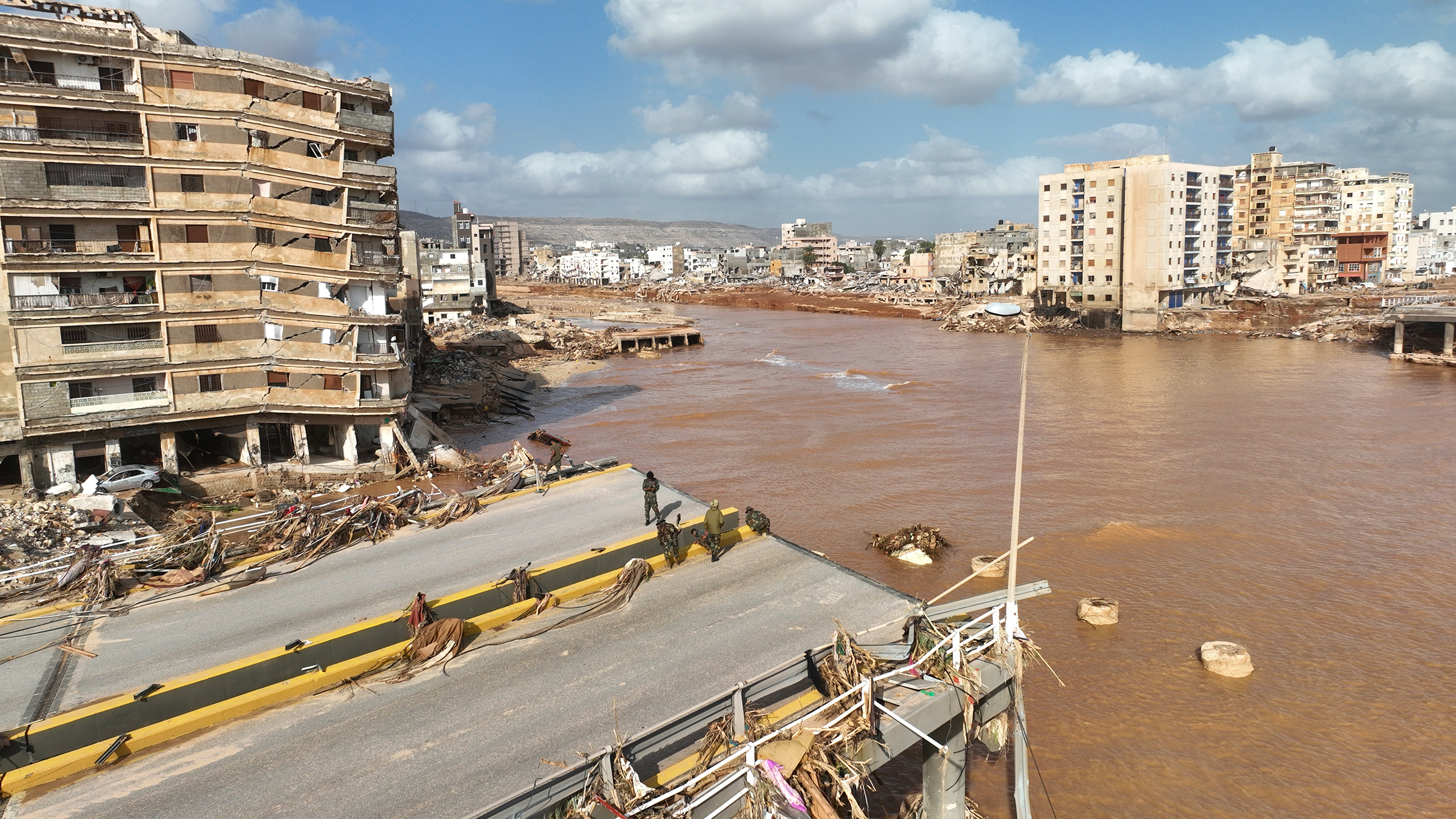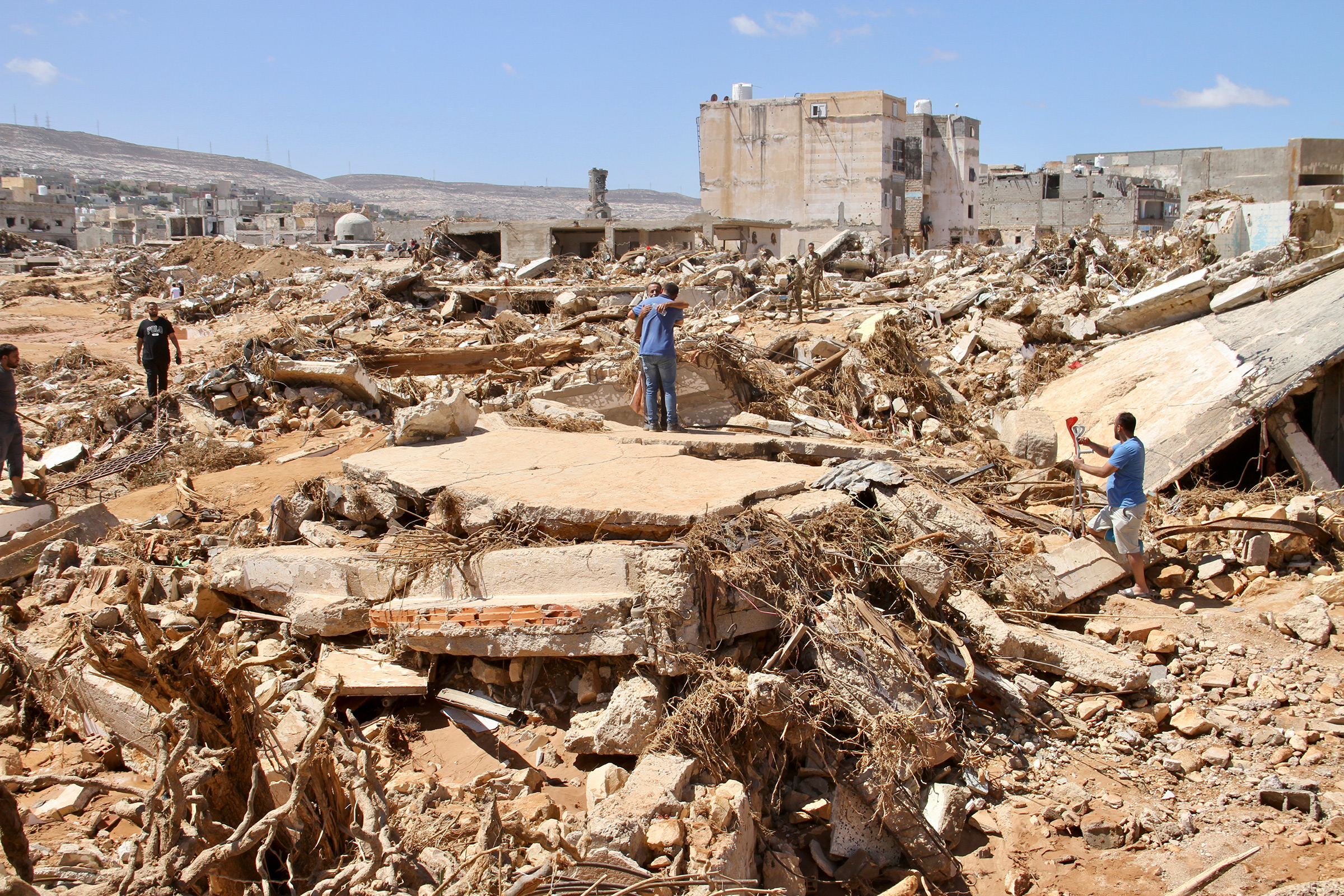A Disaster of 'Mythic' Proportions, Libya
"The focus of efforts is now on burials, so we don't subject the city to a new disaster.""The bodies are in the sea water, and under rubble. So we need specialized rescue teams.""Cars and dead bodies barged into the house. We opened the doors and the water filled the floor, so we moved to the second floor [and the water continued to rise].""[Outside], the corpses were in the hundreds. You open your door and see hundreds; they floated into the buildings from doors, from windows."Husam Abdel Gawi, 31, Derna rescue volunteer"There are conflicts in the number ... of deaths, but what matters is that the deaths number in the thousands.""This disaster is of mythic proportions. A disaster by all measures. Now, the retrieval of the corpses is important, as is burying the copses before they disintegrate ... and cause some environmental issues."Ahmed Zouiten, Libya representative, World Health Organization"[Had there been normal public services available in Libya], they could have issued a warning and also the emergency management authorities would have been able to carry out evacuation of the people, and we could have avoided most of the human casualties."Petteri Taalas, head, UN World Meteorological Organization
 |
Floodwaters from Storm Daniel are visible in Derna, Libya, on Sept. 12.
Jamal Alkomaty—AP
|
The latest numbers of 20,000 people dead in Libya's flood-devastated east, speaks to the shock of a nation under duress to cope with the tragedy. Search and relief efforts are ongoing in a gigantic effort to try to stem the possibility of an additional disaster striking the area in the wake of the current tragedy caused by Storm Daniel when the coast was pounded, submerging neighbourhoods and drawing numberless residents out to sea, to their death.
Derna, the city hardest hit by the storm was alone bereft of between 18,000 and 20,00 of its population, "based on the number of neighbourhoods destroyed", explained Abdulmenam al-Ghaithi, its mayor. The focus of current efforts lie now on accounting for the additional thousands of people considered to be missing. Teams were scouring the city for dead, in the fear the bodies could pose environmental and health risks as they decompose.
Abdel Gawi pointed out that only two overseas special rescue teams were on site, to date. Men carried bodies to trucks to be transported to areas outside the city where trenches had been dug and the corpses were to be buried in mass graves, in this emergency situation. Outside of Derna, 3,000 bodies had been interred with another 2,000 yet to be buried, while teams of divers comb the sea for additional victims.
Three regional hospitals are now completely out of service, although several others remain partially operational. According to Yann Fridez, head of the ICRC's Libya delegation, a wave about seven metres in height "wiped out buildings and washed infrastructure into the sea". Humanitarian efforts to reach the flood-hit east have been hindered by seriously flood-degraded roadways. To complicate matters and add another level of danger, unexploded ordnance and abandoned munition stores in Derna pose another threat.
 |
People look for survivors in Derna on Sept.13. Search teams are combing streets, wrecked buildings, and even the sea to look for bodies in Derna. Yousef Murad—AP
|
Had proper early warning services been in place, the scale of the tragedy could have been avoidable. Since there were none, no evacuation orders had been issued prior to the storm striking the area on Sunday night, irrespective of the fact that Storm Daniel had already left a destructive trail in Greece, Turkey and Bulgaria.
The city of Derna happened to be particularly vulnerable given its geographic placement -- when floodwaters poured down from the hills the city is surrounded by, then burst through two dams, finally washing away a quarter of the inhabited area. Much of it it remains under water.
The landscape, some 135 kilometres outside Derna, was still marked by stagnant floodwaters clogging fields. Dozens of aid trucks and excavators from across the country headed to the affected region even as cars covered in red silt were leaving the flood zone.
| Flooding aftermath is seen in Derna, Libya, Thursday, Sept.14, 2023. (AP Photo/Yousef Murad) |
Labels: Humanitarian Aid, Libya, Mass Burials, Massive Flooding, Search Crews, Storm Daniel

0 Comments:
Post a Comment
<< Home